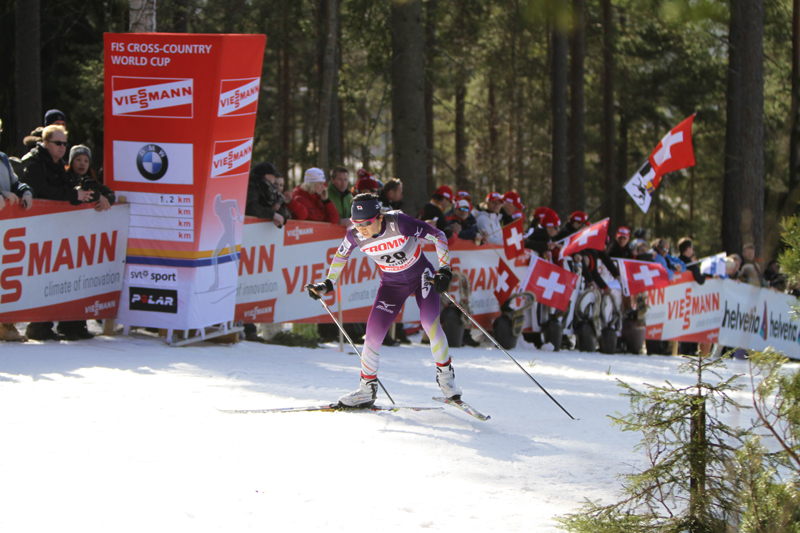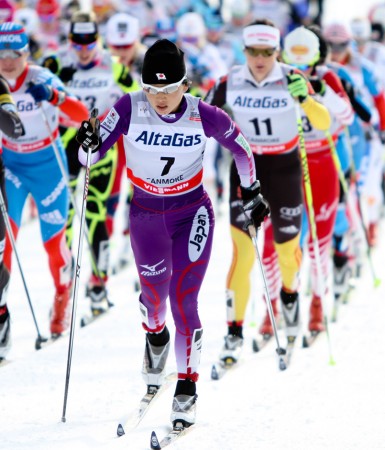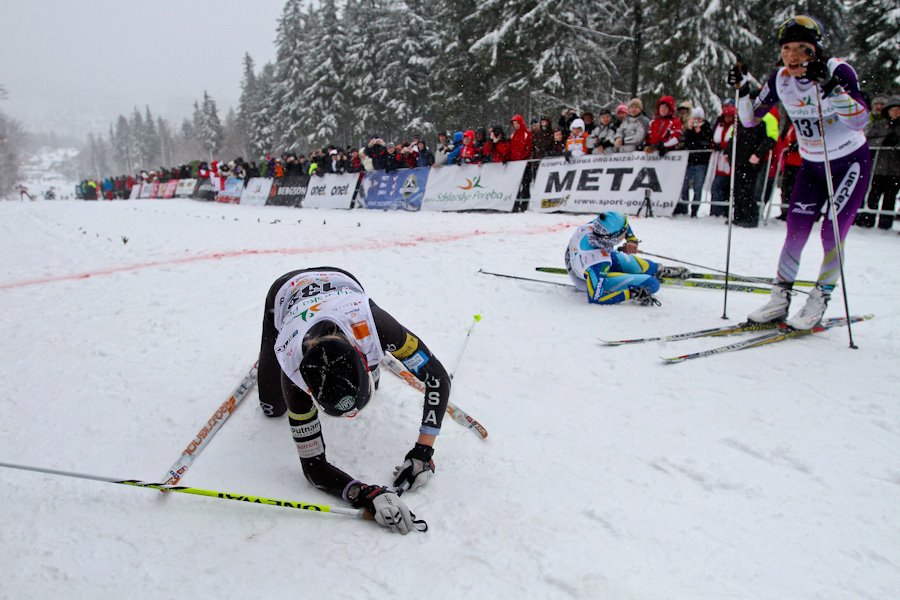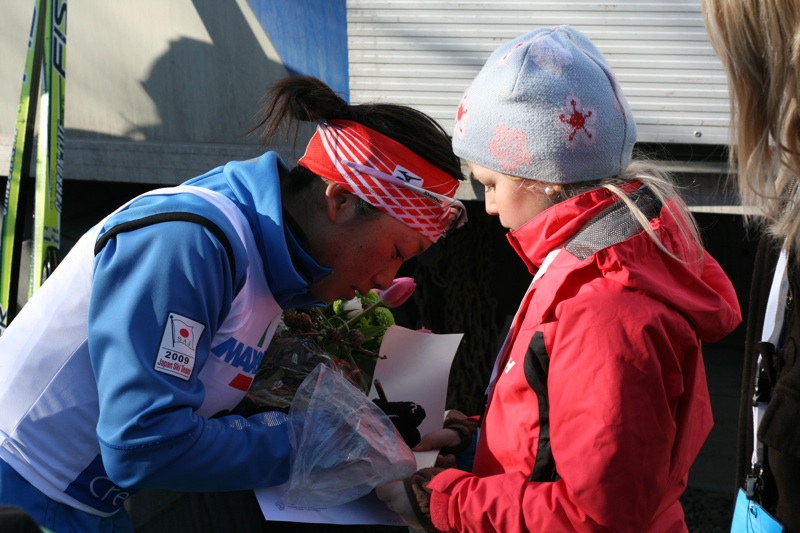
In August, Japan’s Masako Ishida told FIS Cross-Country News she had some very specific goals in mind for the coming season. Among them, she wanted a World Cup podium and some top-five results.
Fair enough. Ishida, now 32, had been there before. Back in 2009, she scored third in a World Cup 30-kilometer classic mass start in Trondheim, Norway. Since she started racing at the sport’s highest level in 2001, Ishida has notched nearly two-dozen top 10s on the World Cup. Six of them came this season, including her seventh-place finish in the 15 k skiathlon at last weekend’s pre-Olympic Sochi World Cup in Russia.
A two-time Olympian, Ishida was fifth in the 30 k classic mass start in Vancouver three years ago. She’s been to five World Championships and placed as high as fourth in the 2009 classic-team sprint in Liberec, Czech Republic.

More than still kicking, she’s been known to push the pace in a number of distance races. And with her sights set on the 2014 Sochi Olympics, Ishida told FasterSkier in an email interview (translated by her coach Hisashi Yamaguchi) last week that she might retire after next season, but she’s not positive. She’s also not sure she can beat Justyna Kowalczyk in a classic race, but she’s not worried about her, either.
FasterSkier: It seems like you’ve been selective with World Cups (after taking nearly a month off the World Cup after Canmore, Alberta, and resuming the circuit in La Clusaz, France). Why did you decide to race in Sochi?
Masako Ishida: Just because there’s a World Cup. If we have chance to get a good result we can go there! Of course next year, the Olympics are there. It would be nice if we can investigate the course, environment and also food.
FS: How do you decide which World Cup races to do? Does it have to do with the team’s budget or finances?
MI: Yes exactly. We don’t have so much budget to participate in of all the World Cups. So we have to choose which race is more priority for us. It is very easy reason.
FS: Would you like to do more World Cups?
MI: Yes, especially this year I had to miss Tour de Ski. This made me very pity. But we don’t have budget. I hope we can get some serious sponsors as soon as possible.
FS: What do you think of your season so far?

MI: It is well done so far. Because I didn’t think I could get 8th place in Kuusamo. Before I never got top 10 in a mini tour or Tour de Ski. Also in the La Clusaz 10km classic, I didn’t think I can follow the leading group such a long time. It was really good experience.
FS: What have you done in training to help you achieve some of your best World Cup results?
MI: This summer I stayed in Jura, France, about 1100 m above sea level … [which is] no effect to training volume. I had a long stay to keep good training volume at good altitude.
[Before] La Clusaz, I did a 30 km classic race in Bessan, France. That was 1750m elevation. After Bessan, I felt La Clusaz at 1400m was not so hard. I guess it was working good.
FS: What are your goals for World Championships? What events will you do? Any chance for a team event?
MI: I try to get podium in 30 km classic. I don’t know what kind of [other] events I will do. Probably I can also try the skiathlon. Team event, the coach will decide.
(Note: When asked what team events Japan will compete in, Yamaguchi said the women will not field a team sprint or relay. With a total of three women and five men, Ishida leads the group as its only B-team skier.
Two other women, Yuki Kobayashi and Michiko Kashiwabara, are on Japan’s C-team along with the men (Keishin Yoshida, Nobu Naruse, Hiroyuki Miyazawa, Akira Lenting, and Yuichi Onda).
“This season our federation made strict rules for the national team,” Yamaguchi wrote. “So we have no one in the A-team. … We have many talented skiers in Japan. That is more often men than women.”
With all five men at World Championships, Japan will likely use some combination of them for team events.)
FS: What is the status of your women’s team? Are there younger women with potential?
MI: It’s a bit difficult to answer because I’m not coach. … Just I really hope young members will get stronger and stronger.
(Note: Asked about his team vision and long-term goals, Yamaguchi wrote, “We try to get first medal in the history of Japan Cross Country in Olympic Games.”)
FS: What do you think of Justyna Kowalczyk? Can you beat her in a classic race?
MI: Justyna is kind with me! And she has very strong mind. I guess this is very good point to be strong race and for life.
I don’t now if I can beat her or not. Anyways, it’s not only Justyna there. And I just go my pace. I can get fans by competing with other strong people. This is basically the reason to compete for me.

FS: How long do you think you’ll continue racing? What would you like to do after?
MI: Probably I will stop after next season, but I [haven’t] decided 100%. I want to study and help young athletes to be strong. But now I have to concentrate to get good results otherwise, there’s no chance to get it. I’m not so [good at multitasking.]
FS: What have you been up to recently?
MI: Nothing special at all. I’m just training and relax and training cycle. I have to do things [and] I do it.
Alex Kochon
Alex Kochon (alexkochon@gmail.com) is a former FasterSkier editor and roving reporter who never really lost touch with the nordic scene. A freelance writer, editor, and outdoor-loving mom of two, she lives in northeastern New York and enjoys adventuring in the Adirondacks. She shares her passion for sports and recreation as the co-founder of "Ride On! Mountain Bike Trail Guide" and a sales and content contributor at Curated.com. When she's not skiing or chasing her kids around, Alex assists authors as a production and marketing coordinator for iPub Global Connection.



